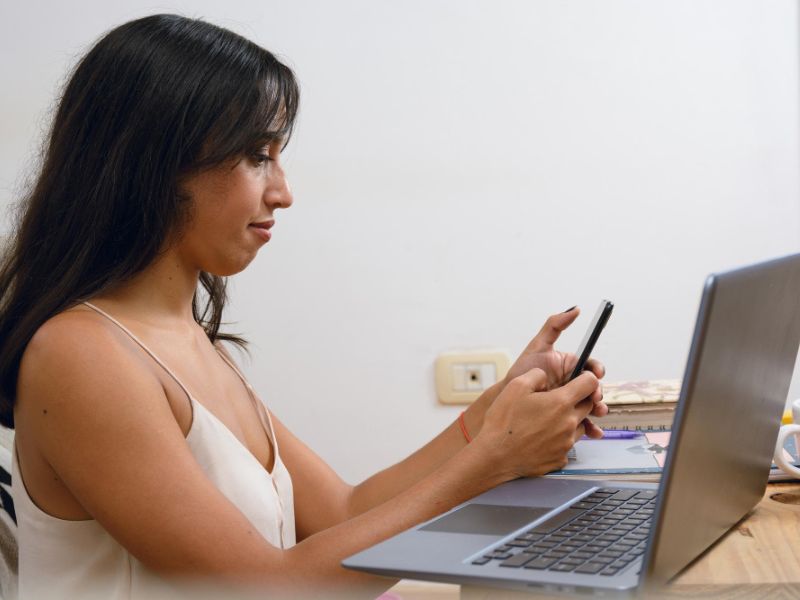 The Covid-19 pandemic continues to have a profound impact on the world of work. As we transition out of lockdown, many organisations have indicated that they will not be asking staff to return to the office until at least September.
The Covid-19 pandemic continues to have a profound impact on the world of work. As we transition out of lockdown, many organisations have indicated that they will not be asking staff to return to the office until at least September.
It is important that we take stock and put in place strategies to look after ourselves, so that we can stay healthy and productive.
While many of us have worked remotely in some form before, many people are unable to take part in their usual routines, and many people are struggling to cope with the demands from work and home. We share seven top tips, drawn from the latest evidence, to help you work well from home.
- Think about physical set up. Working from the kitchen table is fine for a few hours but not for six months. Be your own health and safety assessor and think about your chair and desk positioning, screen height, lighting and ventilation. If you haven’t done already, invest in a separate keyboard and mouse to help minimise arm and shoulder aches.
- Decide where at home work will happen. If you can, choose one room to work from. Doing this maintains a psychological boundary between work and home, minimises disruption in your home and means you are less likely to be interrupted as others will know this is your workspace. You can then declutter and organise your workspace to help you focus.
- Keep (and communicate!) your routine. Try to simulate a ‘normal day at the office’. Setting your alarm, get dressed, have breakfast away from your desk, set start and finish times to prevent work creeping into the evenings. If you are working ad hoc hours to manage care responsibilities, communicate this to your co-workers so that they don’t feel compelled to work longer hours too; and to your friends and family so that they know when you are trying to focus on work.
- Reach out and keep talking. Social isolation is one of the major risks of home working. Loneliness is on the rise and the rapid change has been combined for some with concern about health, finances, being isolated from others and bereavement. Plan regular meetings with colleagues but also reach out with adhoc social interactions.
- Accept this is an evolving journey. This situation is not easy, things are changing all the time. What worked last week may not work this week due to changes in care responsibilities, things that are going on at home or work deliverables. Acknowledge the difficulties this new way of working poses, talk openly and honestly, and be prepared to change your ways of working and accept that others may need to do so too.
- Remember to take breaks and use rituals to set boundaries for work and home time. Without the social cues from the work environment (for instance people going for lunch or going to get a coffee), we are more likely to sit at our desks all day. Regular breaks are good for productivity and our physical and mental health. Establish some new rituals like walking around the block, having a coffee in the garden or reading a book to help you separate your work time from your respite.
- Look after yourself. We can easily slip into some bad habits when we work from home. Make sure you build exercise into your day; with the fridge close to hand, plan what and when you are eating so that you stick to healthy lunches and snacks rather than gravitate to the biscuit tin and toast; put work away in the evening so you are not tempted to answer one last email and have a regular bedtime routine to improve your sleep quality.
We are all facing challenges, whatever our circumstances at work and home. While there will be some people who are able to focus on new goals and hobbies, for the majority of us, now is the time for ‘good enough is good enough’. Try to accept the constraints of your situation, acknowledge your successes and don’t overextend yourself. This is going to be a long journey so we need to look after ourselves, and each other, along the way.
About the authors
Jo Yarker and Rachel Lewis are Directors of Affinity Health at Work and Programme Directors of the Professional Doctorate in Organizational Psychology at Birkbeck, University of London. They work in a job share arrangement across both roles and together they are passionate about improving health and wellbeing at work. Their research and practice have been multi-award winning and has been funded by the Chartered Institute of Personnel and Development, ACAS and the Health and Safety Executive, and public sector and corporate clients.
If you are a job seeker or someone looking to boost their career, then WeAreTheCity has thousands of free career-related articles. From interview tips, CV advice to training and working from home, you can find all our career advice articles here.








